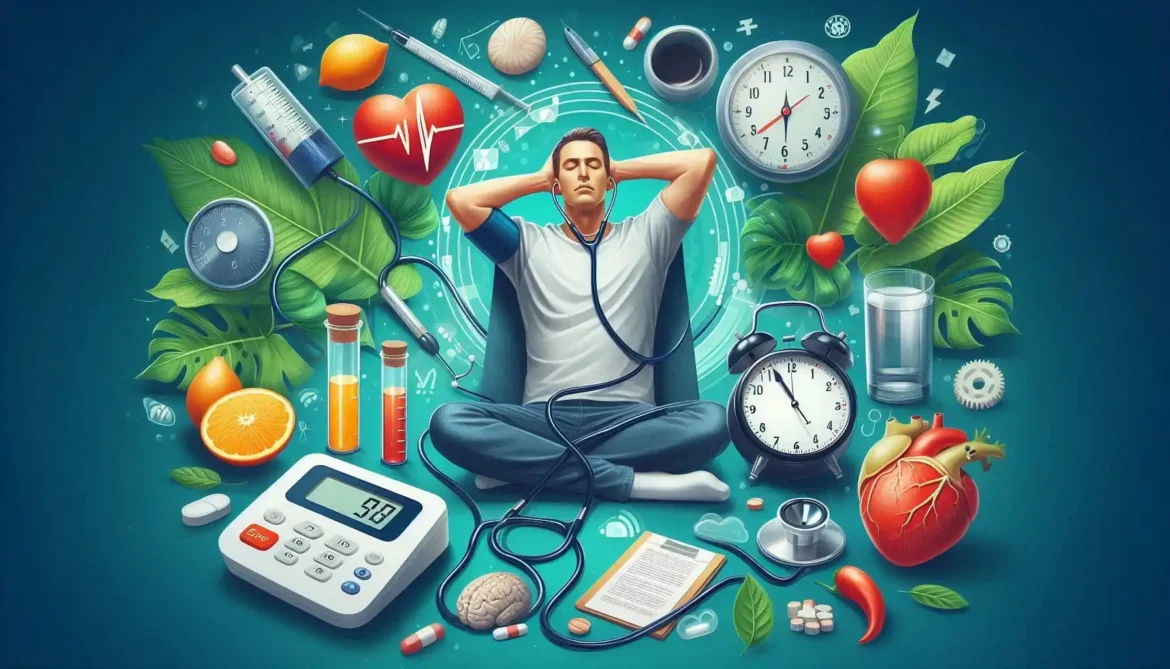
Proven Ways to Lower Blood Pressure Naturally and Effectively
As we go about our daily lives, there’s a vital aspect of our health that we often overlook until it becomes a pressing concern. We’re referring to blood pressure, a fundamental indicator of our cardiovascular well-being. In this article, we’ll delve into the world of blood pressure, exploring what it is, its causes and symptoms, necessary precautions, treatment options, and why maintaining control over it is crucial for our overall health.
What is Blood Pressure?
Blood pressure, or BP, is the force exerted by blood upon the vessel walls as it circulates throughout the body. It is measured in millimeters of mercury (mmHg) and consists of two main components:
- Systolic Pressure: The top number, which measures the pressure in the arteries when the heart beats (contracts).
- Diastolic Pressure: The bottom number, measuring the pressure in the arteries between beats when the heart relaxes.
A normal blood pressure reading is typically around 120/80 mmHg. However, when this pressure is consistently too high, it can lead to a condition known as hypertension, which poses significant risks to our health.
Causes of High Blood Pressure
High blood pressure can result from a combination of factors, including:
- Genetics: Family history plays a significant role in the development of hypertension.
- Age: The risk increases with age.
- Obesity: Being overweight or obese is a major risk factor due to the additional strain on the heart.
- Physical Inactivity: Lack of regular exercise can contribute to the development of high blood pressure.
- Sodium Intake: Consuming too much sodium can lead to fluid retention, which increases blood pressure.
- Stress: Chronic stress can contribute to high blood pressure.
“The greatest wealth is health.” – Virgil
Understanding these causes is crucial because it empowers us to take proactive steps towards preventing or managing hypertension.
Symptoms of High Blood Pressure
Interestingly, high blood pressure often doesn’t display noticeable symptoms, which is why it’s frequently referred to as the “silent killer.” However, when symptoms do appear, they can include:
- Headaches
- Dizziness
- Nosebleeds
- Fatigue
- Vision changes
It’s essential to monitor blood pressure regularly, as the absence of symptoms does not necessarily mean that everything is okay.
Precautions and Lifestyle Changes
Before we dive into treatment options, let’s explore some precautions and lifestyle adjustments that can significantly impact blood pressure:
- Maintain a Healthy Weight: Losing weight if you’re overweight can help lower your blood pressure.
- Engage in Regular Physical Activity: Aim for at least 30 minutes of moderate-intensity exercise per day.
- Eat a Balanced Diet: Focus on fruits, vegetables, whole grains, lean protein, and low-fat dairy.
- Limit Sodium and Alcohol: Be mindful of your intake to avoid exacerbating blood pressure issues.
- Manage Stress: Techniques like meditation, deep breathing, or yoga can help mitigate the effects of stress on blood pressure.
Treatment Options
For those diagnosed with hypertension, treatment plans may include:
- Medications: Various types can help lower blood pressure, such as diuretics, ACE inhibitors, and beta-blockers.
- Lifestyle Modifications: As mentioned earlier, changes in diet, exercise, and stress management are foundational in controlling blood pressure.
- Monitoring: Regular check-ups with your healthcare provider are crucial to adjust treatment plans as necessary.
Why is it Important to Keep Blood Pressure Under Control?
Maintaining healthy blood pressure is vital for preventing complications such as:
- Heart Disease: High blood pressure can lead to heart failure or heart attack.
- Stroke: The risk of stroke increases significantly with uncontrolled hypertension.
- Kidney Disease: The kidneys can be damaged by high blood pressure, leading to kidney failure.
- Vision Loss: High blood pressure can cause blood vessels in the eyes to bleed or burst, leading to vision loss.
Here are some key reasons to keep blood pressure in check:
- Reduced Risk of Cardiovascular Diseases: Lowering blood pressure decreases the strain on the heart and arteries.
- Improved Quality of Life: By avoiding the complications associated with hypertension, individuals can enjoy a healthier, more active life.
- Longevity: Effective management of blood pressure can extend life expectancy.
| Category | Systolic | Diastolic |
| Normal | Less than 120 | Less than 80 |
| Elevated | 120-129 | Less than 80 |
| Stage 1 Hypertension | 130-139 | 80-89 |
| Stage 2 Hypertension | 140 or higher | 90 or higher |
This table helps in understanding the different categories of blood pressure, emphasizing the need for regular monitoring.
Conclusion
Blood pressure is a critical aspect of our overall health, and its management is essential for preventing serious cardiovascular conditions. By understanding the causes, recognizing the symptoms (when they appear), taking necessary precautions, and adhering to treatment plans, we can maintain healthy blood pressure levels. Remember, the power to protect our health is in our hands, and through informed decisions and proactive measures, we can ensure a healthier, happier life for ourselves and our loved ones.
Here are some final takeaways to consider:
- Regularly monitor your blood pressure.
- Adopt a lifestyle that supports heart health.
- Stay informed and consult with healthcare professionals when necessary.
- Support loved ones in their journey to manage blood pressure.
Together, we can prioritize our health and well-being, one step at a time.
FAQs on Controlling Blood Pressure with Natural Remedies and Lifestyle Changes
Q1: Can I lower my blood pressure with natural remedies?
A1: Yes, several natural remedies and lifestyle changes can help lower blood pressure. These include dietary changes, regular exercise, stress management, and the use of certain herbs and supplements. However, it’s important to consult with a healthcare provider before making significant changes, especially if you are already on medication.
Q2: What are some foods that can help lower blood pressure?
A2: Foods rich in potassium, magnesium, and fiber can help lower blood pressure. Some examples include:
- Fruits: Bananas, oranges, cantaloupe, honeydew, and dried apricots.
- Vegetables: Spinach, broccoli, sweet potatoes, and carrots.
- Legumes: Lentils, chickpeas, and kidney beans.
- Whole grains: Oats, quinoa, and brown rice.
- Dairy: Low-fat milk and yogurt.
- Nuts and seeds: Almonds, walnuts, and flaxseeds.
Q3: How does exercise help in controlling blood pressure?
A3: Regular physical activity can help lower blood pressure by strengthening the heart, improving circulation, and reducing stress. Aim for at least 150 minutes of moderate aerobic activity or 75 minutes of vigorous activity per week. Activities like walking, swimming, cycling, and dancing are excellent choices.
Q4: Can stress management techniques lower blood pressure?
A4: Yes, managing stress is crucial for controlling blood pressure. Techniques such as deep breathing, meditation, yoga, and progressive muscle relaxation can help reduce stress and lower blood pressure. Regular practice of these techniques can lead to long-term benefits.
Q5: Are there specific herbs and supplements that can help lower blood pressure?
A5: Some herbs and supplements have been shown to help lower blood pressure, but their effectiveness can vary. Common ones include:
- Garlic: Known for its ability to relax blood vessels and improve blood flow.
- Hibiscus tea: Studies suggest it can lower both systolic and diastolic blood pressure.
- Fish oil: Rich in omega-3 fatty acids, which can help reduce blood pressure.
- Coenzyme Q10 (CoQ10): May help lower blood pressure in some individuals.
- Hawthorn: Traditionally used to support heart health and may help lower blood pressure.
Q6: How does reducing sodium intake help in controlling blood pressure?
A6: Reducing sodium intake can significantly lower blood pressure. The American Heart Association recommends no more than 2,300 milligrams (mg) of sodium per day, with an ideal limit of no more than 1,500 mg per day for most adults. You can reduce sodium by:
- Reading food labels and choosing low-sodium options.
- Cooking at home to control the amount of salt added.
- Using herbs and spices instead of salt to flavor foods.
Q7: Can weight loss help in controlling blood pressure?
A7: Yes, maintaining a healthy weight is crucial for blood pressure control. Losing even a small amount of weight can make a significant difference. For every 1 kg (2.2 lbs) of weight lost, systolic blood pressure can decrease by about 1 mm Hg. A balanced diet and regular exercise are key to achieving and maintaining a healthy weight.
Q8: How does alcohol consumption affect blood pressure?
A8: Excessive alcohol consumption can raise blood pressure. If you choose to drink, do so in moderation. The American Heart Association recommends no more than one drink per day for women and no more than two drinks per day for men.
Q9: Can quitting smoking help in controlling blood pressure?
A9: Yes, quitting smoking can help lower blood pressure and improve overall cardiovascular health. Smoking damages blood vessels and can lead to a temporary increase in blood pressure. Quitting smoking can have immediate and long-term benefits for your heart and blood pressure.
Q10: How can I monitor my blood pressure at home?
A10: Monitoring your blood pressure at home can help you track your progress and make necessary adjustments to your lifestyle and treatment plan. You can use a home blood pressure monitor, which is available at most pharmacies. Follow the instructions carefully and record your readings to share with your healthcare provider.
These FAQs provide a comprehensive overview of natural remedies and lifestyle changes that can help control blood pressure. Always consult with a healthcare provider before making significant changes to your diet, exercise routine, or medication.
Medical Disclaimer:
The information provided on this website is for general educational and informational purposes only and is not intended as a substitute for professional medical advice, diagnosis, or treatment. Always seek the advice of your physician or other qualified health provider with any questions you may have regarding a medical condition. Never disregard professional medical advice or delay in seeking it because of something you have read on this website.





